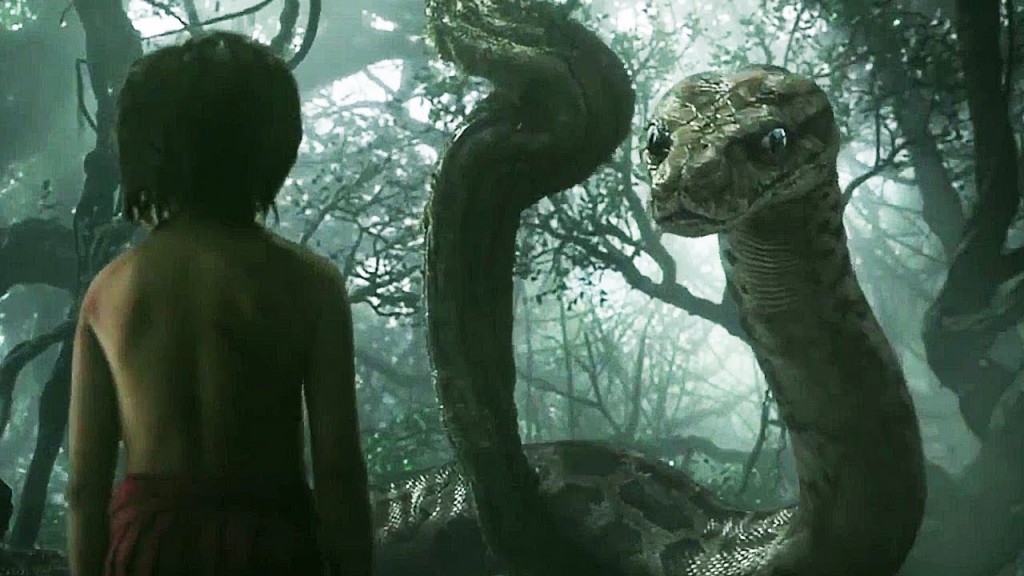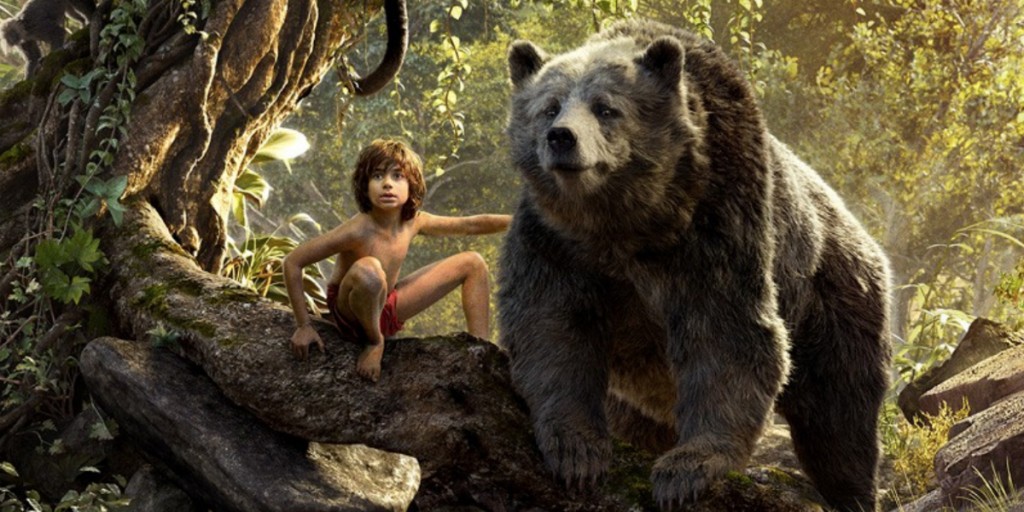It’s not hard to figure out why reboots, remakes and revivals hold so much sway in Hollywood lately. Reusing established names and stories provides built-in name recognition and familiarity. It’s a strategy that lets you either play to nostalgia and comfort (I recently discovered they’re still making Ice Age movies, with one coming out this year) or come up with a new angle (RoboCop and Judge Dredd were both redone with an eye for political commentary, while Star Trek moved away from that in favor of action). The problem is when a remake doesn’t know what it wants to be and can’t commit to any particular take, one way or another. It’s the main issue I had with The Jungle Book, an otherwise impressive, fun film.
Jungle Book, directed by Jon Favreau, is broadly a remake of the 1967 animated film, but it introduces some elements from Rudyard Kilping’s original work, as well as some original ones. Young “man-cub” Mowgli (Neel Sethi) is forced to leave his home among the wolves of the jungle by the tiger Shere Khan (Idris Elba). Accompanied by wise panther Bagheera (Ben Kingsley) and lazy bear Baloo (Bill Murray), Mowgli heads to the nearest human village, evading Shere Khan, hypnotic snake Kaa (Scarlett Johansson), and giant ape King Louie (Christopher Walken).

This Jungle Book has a lot in common with its predecessor, but the overall tone here is much darker, driven less by songs and physical comedy and more by lush animation and big setpieces. Jungle Book was filmed entirely on soundstages, so all characters and most locations are CGI. It’s impressive, in terms of both scale and design, but it sort of hampers a couple performances. There’s a lot of pressure on Sethi, as the sole physical actor for most of the film, but he doesn’t always sell the interactions with the added-in-post characters. He’s a great physical performer, but more than once he seems like he’s reciting the Pledge of Allegiance rather than genuinely conversing. The vocal performances are hit or miss, with Murray seemingly sleepwalking through these line readings and Walken altogether out of place. There are a fair number of highlights, though, like Lupita Nyong’o as Mowgli’s adoptive mother Raksha, Elba’s sinister, clever Khan, and Johansson’s spooky, seductive take on Kaa.

The film doesn’t have a ton of laughs, but it’s imbued with an engaging sense of mystery and wonder. The jungle is an unknown world for Mowgli to explore, filled with creatures both majestic and dangerous. One of the film’s strongest moves is recasting the elephants, formerly a riff on British soldiers, as revered creators and protectors of the jungle. Giving them a nonhuman but clear intelligence is a nice touch, and it plays to the theme of order in the film. There’s a lot of emphasis on the laws of the jungle and the roles and obligations of its inhabitants. Tonally, much of it is similar to Kipling’s works, fables with a clear moral weight and emphasis. It touches on the importance of law, but also how easily it can be twisted, like a scene when Shere Khan is “educating” some wolf cubs with a story about a cuckoo bird, which enthralls them but is also an attempt to turn them against their mother.
The parts of the movie that feel out of place are the attempts to keep it a bit lighter and more breezy. The few songs they carry over from the musical version feel mostly out of place, and the juxtaposition of slapstick gags with character death is a little off-putting. There are two different movies here, a child-friendly spectacle and a darker, more mature fairy tale, and they’re fighting for space.

The clearest example of this is a sequence in which Mowgli is abducted by monkeys. They bring him up a mountain to a ruined temple, approaching with an eerie, almost religious reverence. Within the temple is King Louie, an enormous Gigantopithicus, mostly hidden by shadows. It’s a tense moment…until he starts speaking with Christopher Walken’s voice. Walken’s usual shtick makes Louie come across less like an ominous ruler and more like a shady Teamsters boss from New Jersey. If this wasn’t enough, he then launches into an awkward spoken-sung version of “I Wanna Be Like You,” until Baloo and Bagheera arrive. At this point, the movie shifts back into action mode, with Louie climbing the temple like King Kong, attempting to snatch Mowgli up. The film tries to have its cake and eat it, too, going for more dramatic, action-oriented takes on the story without giving up the silliness that would’ve made those takes a bad fit to begin with.
The Jungle Book is rated PG. I don’t want a darker, more violent version of the movie that’s rated PG-13, necessarily. But I’d have liked it to commit to a more cohesive tone and vision for the story. If that version ended up goofier and more child-friendly, it’d probably be less to my tastes, but it’d still be an improvement. Personally, I’m more into the darker, more fantastic elements, but the glimpse we got here left me more hungry than satisfied. There’s plenty to like, but it doesn’t come together in the end with a committed idea.
